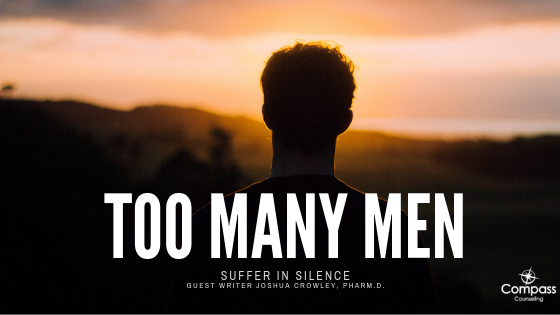Too Many Men Suffer in Silence By Guest Writer Joshua Crowley, Pharm. D.
It is Men’s Health Week and I want to continue the discussion by talking about the subject of depression. While approximately 30% of all men have reported that they experience or have experienced depression that number is likely much higher.
There is a stigma in our society regarding mental illness in general, but for men that stigma extends to gender roles that are archaically defined when it comes to emotional and mental health. Men have been pressured by society for years to assume the mantle of indomitable will and unstoppable force. This as a result has translated into this convoluted idea that men should be unemotional. That instead of emoting, they should refrain from expressing their fears, their anxieties, and their sadness because to do so could leave them looking weak or incapable of serving as “the man” of their respective worlds.
This could not be farther from the truth; this type of mindset is toxic and creates an environment where men cannot safely seek help from their peers when they are in need of emotional support. It also establishes a firm impression of rejection early on in development when men are just boys trying to communicate their feelings to those around them who should be reciprocating, validating, and encouraging these expressions, but instead retort with mockery, dismissal, or chastisement. A lot of us are just trying to “deal” with problems alone and not to talk about them. However, men are just as vulnerable as women to, but less likely to talk about it.
Symptoms of depression in men can be quite different than that of women and therefore are commonly mislabeled leading to further emotional detachment and rejection. Men who are suffering from depression may lash out and become angry over little things or they may try to micromanage their environment to exert some form of control because they feel out of control of their life. Men with depression may withdraw from social settings and isolate themselves from friends, family, and peers. Depression can also manifest in physical symptoms such as fatigue, unexplained pain, racing heart rate, headaches, digestive issues, and many more. Because of this depression in men can easily be explained away, downplayed, or written off as personality traits. However, depression if left untreated can be a terminal mental illness in men. Depression is a slow killer. It wears away at your mind, your spirit, and your body. Men with depression may also develop hypertension, anxiety disorders, and in extreme cases may become suicidal.
If you are reading this and wondering how to help a man in your life cope with depression it is simple. SUPPORT THEM.
When they come to you and they look exhausted ask them if they are alright, when they reply with the age old “Yeah, I’m fine.” Respond with something like “No really, how are you?” Remember, men are not encouraged to express their true feelings; you are going to have to show them you want to know how they truly feel before you ever hear how they are. Some men may not notice how isolated they are becoming, they may be filling their time with “busy” work to take their mind of how they are feeling. Keep sending those invitations, keep asking them to go to dinner, catch a movie, grab a coffee, or just shoot the breeze from the front stoop. Men with depression need your constant reminders that they are wanted, that they are missed, and that they have value to others.
Men who have dealt with depression in their lives can support other men that they see suffering in silence. Share your stories, talk openly and candidly about your experiences with depression, and encourage others to do the same. The cycle of silence regarding depression in men must be broken for the betterment of our society for the young men coming up behind us! We should strive for a world where men can be emotionally secure and emotionally empowered in times of weakness to reach out. We can educate people and healthcare providers on the signs and symptoms of depression in men that often get missed. We can make it OK for men to talk about depression so that they can get the help that they need.
If you or someone you love is displaying the signs of depression, educate yourself and start the conversation. They may not even know why they feel run down and tired all the time. They may not see what they are doing to those around them. You do not have to go through this alone because you ARE NOT alone. Seek out a mental health counselor or talk to your healthcare provider if you feel that you may be suffering in silence with depression.
Download our Free E-Book 10 Questions to Ask Before Starting Counseling. Learn more at www.compasscounseling.com If you would like to schedule an appointment today click here!
This post is was shared with us by guest writer Joshua Crowley, Pharm.D. Josh created his business Congruence in Care as a way for patients to get access to overall healthcare. The team consists of a pharmacist and nurse practitioner with several other disciplines from mental health to physical therapy at their disposal.
After completing his Doctor of Pharmacy from the University of Kentucky in 2005, Josh worked in many different facets of pharmacy practice from retail, long term care, and consulting. To learn more about Congruence in Care check out the website here.
““Not talking about our inner lives robs us of really getting to know ourselves and robs us of the chance to reach out to others in need.” ”

